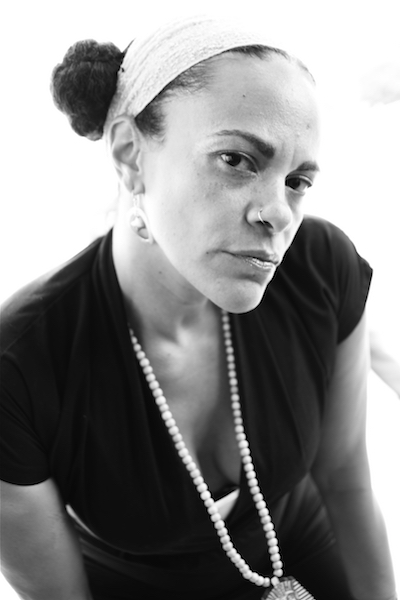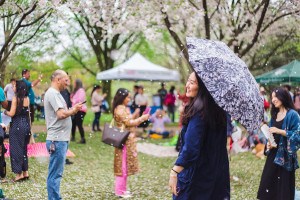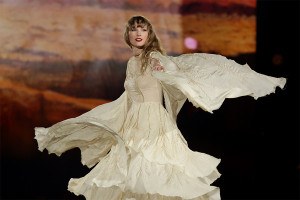9 Questions With the Phenomenal Ursula Rucker

Photo by Wendel Patrick
You know what the world needs now? An army of Ursula Ruckers. She’s the Germantown-based, soft-spoken, truth-telling spoken word poet and recording artist whose words are tight with poignancy, wisdom, fury, pain and female strength. She’s like a fearless warrior of the real, unafraid to be unguarded and point the way out of hardship into better times. She is one of the headliners at the 14th Annual First Person Arts Festival (running November 4-15), performing her 90-minute spoken word memoir, My Father’s Daughter, this Friday at Plays & Players Theatre.
One of the reasons why her spoken word poetry and songs about urban reality are so effective is her delivery. Rucker has a beautifully delicate voice that says the most extraordinary things, but in a somewhat flat, contained manner. Because she’s not yelling, but instead, quietly delivering her stories; the message comes in under the defenses like a verbal grenade that rolls in under the fence and then explodes.
“I’m not everybody’s cup of tea,” says Rucker. “One of my dearest friends who does what I do, Jessica Care Moore, out of Detroit, said to me it’s like I’m taking a knife and digging it into their gut while at the same time I’m hugging them and telling them I love them.”
Born and raised in Philadelphia, Rucker graduated from Temple University’s journalism program and launched her career in 1994 during an open mic night at Center City’s club Zanzibar Blue. Rucker was a part of the hip crowd of eclectic talent and friends that flocked to King Britt and Dozia Blakey’s Back to Basics weekly dance party at Silk City in the ‘90s. People like The Roots, Erykah Badu, Jill Scott and DJ Jazzy Jeff performed, as did Rucker, refining their craft and making connections. Rucker has produced five albums and through the years has toured with Jamaaladeen Tacuma, Sylk 130 and 4hero. Though she teaches at Muhlenberg College, she plans to go back into the studio soon for her next album.
We caught up with the activist poet at the Northern Liberties Cafe La Maude, where she was taking a break, to talk about her family’s story of domestic abuse and addiction in My Father’s Daughter.
I was watching the trailer for the 2008 documentary Ursula Rucker: Poet and in it Ahmir Thompson, aka Questlove, of The Roots, says you are his personal savior and I’ll tell you why, but then the trailer cuts away. Why did he mean?
I think he says that because I recorded the poem “The Unlocking” for their first album Do You Want More?!!!??!. It was a last-minute thing. Poet Ntozake Shange was out of town and they were under a deadline to finish the album and Ahmir called me. We’d become friends at Silk City when King Britt and Dozia Blakey were doing their Back to Basics party. We were friends and I had just started doing some performances and had made a recording with King Britt [1994 club classic, “Supernatural”]. Ahmir decided to trust me.
https://www.youtube.com/watch?v=51w7L6xLgXY
Can you tell me a little about My Father’s Daughter?
It’s a memoir/epic poem. It’s most directly about my mother’s life. It tells her story but within hers is mine. Her life informs mine and still does; her wild, crazy life that most people could probably not survive, and how I survived it with her and deal with a lot of that pain and navigate through my life with that history. Now at 83, my mom’s still wilder than most people. [laughs] She’s a piece of work. Life has beat her up and affected her in a lot of ways, so it’s a story of survival and forgiveness and healing. It’s very raw, with a lot of shocking things and crying. It was very difficult to share it the first time. You never know how other people will receive that sort of thing.
How do you keep some emotional armor on and at the same time be open and vulnerable when telling your story?
You can’t think about it too much, if you thought about it too much you wouldn’t do it. It’s so raw, so visceral and of course you put intention and time into it, but then it’s a mix of “let this shit go, let it fly,” and see where it lands.
How did you feel after its debut?
I felt spent. Even if I was just speaking these words it would be enough, but coupled with Tim Motzer’s music, well sometimes I’d hone in on his sounds, and be about to lose it in front of everybody. It’s a roller coaster, a mix of a job to do and also “oh my goodness, I’m caught up in this wave.” So there’s all of that going on. It’s pretty wild … it’s not for everybody, it’s not easy, but it seems to be working, I feel good about it. This story has been sitting with me for 20 years and not knowing how it would manifest, I’d say I’m very happy how it unfolded and what it’s become.
What was your mother’s response to it?
My mom hasn’t seen it yet, but many people who came to see it and know her told her how good it was. She loved the feedback. It would be difficult for her to sit in the audience because I do say things that would be hard for her to handle. But at the end of day, I’m honoring my mother’s life, even if I say she can get on my goddamn nerves.
How did you decide what to go in and what to keep out?
It was a very difficult process to go through all of the material and then decide, is it too much or is it enough? It was a very private creative process. I wrote some things and came to my director Jenny who’s a good friend, and passed it by her. We cried every day as we went over it. We had to have lots of tissues. After our creative sessions I’d ask “Do I want to do this in front of people?” But the talk-back sessions afterward help me level out.
I put all of my heart and soul into it. It’s totally uncensored, but people can totally relate to the work. If you haven’t had the same life experiences, it still resonates with anyone who’s had to overcome something. That’s what this piece of art is, it answers the question of how I do it, how I can wake up every day. Then there’s its amazing music. The soundscape is incredible and there are visual images behind me the whole time. It’s an assault on the emotions and the senses. There’s humor, because with pain there’s humor. If you don’t have humor, you might as well check out.
You say your mom’s struggles shaped who you are today. Can you tell me about that evolution?
Her struggles essentially created the person who’s able to make this piece and put it in front of people. She’s made me strong enough to keep going when I think that I can’t. I think about my mom and that if she could do what she did, then I can keep going.
Tell me about the music in My Father’s Daughter.
Timothy Motzer and I have been working together for 16 years now. We know each other inside and out, not romantic, but friends and co-creators. Our synergy is undeniable. He is always on the cutting edge and surpassing boundaries. We feed off of each other during performances. We’re constantly weaving in and out of each other. It’s like a really fun math problem that you’re solving the whole time. It feels good. I trust him with my art and my heart. And he trusts me with his.
Who inspires you?
Sonia Sanchez. She’s my artistic mother. From day one when I was in high school and found out about her work, I’ve been following her. She’s my mentor, the person I can call on the phone. She’s an example of what you want to strive for, her fire, her still doing it in face of raising kids, fighting and bucking the system and never compromising. She changes people’s lives and has never lost the fire. At 81, she’s still doing her poetry. That’s what I want.
My Father’s Daughter plays on November 6th at 8 pm at Plays & Players Theatre. For more information and tickets, go here firstpersonarts.org.


